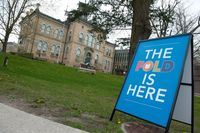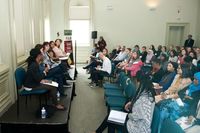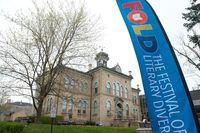All Roads Lead to Brampton
By Jael Richardson & Submitted by Kevin
We’ve been tallying up the responses for surveys from last month’s Festival of Literary Diversity and we’re thrilled by all the feedback – the good and the bad. It’s helpful to know what worked and what didn’t. It’s interesting to see what meant a lot and what needs improvement. But there’s one comment we’ve encountered a lot that we want to address right away: This event should be in Toronto.
The Festival of Literary Diversity took place in Brampton – 20 kilometers from Pearson International Airport and 34 kilometers from Toronto’s Union Station. For those unfamiliar with the area, the FOLD was closer to Union Station than other parts of Toronto – including the Toronto Zoo and York University. But people from Toronto want it closer.
If you’re part of the literary community, and you live in the GTA – in one of the suburbs outside “Toronto proper” -- you’re probably rolling your eyes right now. If you’re anything like me, you travel by transit or by car to Toronto to attend all major literary events. Every awards night. Every book launch. Toronto. Toronto. Toronto. Midweek, midday, it doesn’t matter. It all happens in Toronto.
But for authors and publishing professionals in particular, suburban neighbourhoods are worth noticing. Brampton, in particular, is significantly underserved by Canada’s literary economy – especially when it comes to diverse, Canadian content.
In a city of 600,000, Brampton doesn’t have a single independent bookstore that offers a diverse range of Canadian content. There’s no Another Story Bookshop or Book City franchise. Our libraries offer reading series, but there’s no Bruhm Appel Salon with major international authors like Marlon James and Junot Diaz doing events that are free for audiences. There’s no Speakeasy, or DRAFT, or Brockton Reading Series – series which benefit readers and writers alike.
Before the FOLD, libraries and chain bookstores were the only place that 600,000 people could find stories that they could touch with their hands or encounter via live readings and panels without going to Toronto. This is worth noting for anyone involved with small or medium-sized presses and anyone writing poetry or stories that push boundaries that don’t happen to win a major award – where being seen and getting heard makes a significant impact on book sales (at the FOLD, Waubgeshig Rice’s Legacy, a 2014 Theytus Books title, was the first title to sell out!).
When plans for the FOLD started, we considered Toronto for lots of the reasons critics of
the location have presented. It’s bigger. We would get more people. But what about Brampton? I happen to live there – as did many of the team members. We love books. Why not here? Why not build our own unique literary culture?
Brampton had never hosted anything like a literary festival. For every Brampton venue we went to, we had figure out what would work best with no plan to follow. The closest hotel that could suitably host our authors required a shuttle. When it comes to arts festivals, we always go to Toronto.
But as city staff told us recently, if Brampton is ever going to grow, if we are ever going to attract a hotel to our downtown, if we are ever going to develop a literary hub that provides 600,000 people with better access to diverse literature and Canadian content, we have to develop our own robust arts culture. We have to stop existing as a bedroom community – a place where people sleep, a place they leave to do more interesting things elsewhere. We have to confront the philosophy that “all good things happen in Toronto” – that all good events are located on the TTC Subway Line.
Your CanLit News
Subscribe to Open Book’s newsletter to get local book events, literary content, writing tips, and more in your inbox
Our diverse approach to this literary festival is not just about authors and literary genres. As our friend Paul Vermeersch said so aptly at the inaugural festival, “The FOLD is also about geographical diversity”.
So we’ll be doing it in Brampton again next year. Don’t worry, it’s not as inaccessible as Torontonians think – for car drivers and transit users. You certainly don’t have to pay $25 a day to park your vehicle. So whether you’re coming from the GTA or beyond get your GoTransit maps and your transit apps or your GPS ready. But you can leave your parking money at home, we’ve got you covered.
And for those living further away, outside the GTA where this problem of literary event accessibility is compounded even further, don’t worry. We haven’t forgotten you.
The views expressed by Open Book columnists are those held by the authors and do not necessarily reflect the views of Open Book.
Jael Richardson is the author of The Stone Thrower: A Daughter's Lessons, a Father's Life, a memoir based on her relationship with her father, CFL quarterback Chuck Ealey. The book received a CBC Bookie Award and earned Richardson an Acclaim Award and a My People Award as an Emerging Artist. A children's book called The Stone Thrower came out with Groundwood Books in 2016. Her essay "Conception" is part of Room's first Women of Colour edition, and excerpts from her first play, my upside down black face, are published in the anthology T-Dot Griots: An Anthology of Toronto's Black Storytellers. Richardson has an MFA in Creative Writing from the University of Guelph, and she lives in Brampton, Ontario where she serves as the Artistic Director for the Festival of Literary Diversity (The FOLD).





